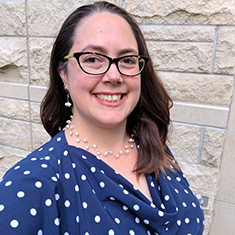Grinnell alumna enriching how physics is taught, researched
Jan. 30, 2019 — While a physics professor herself, Eleanor Sayre ’02 also has been instrumental in providing recommendations and information for others teaching physics.
 Eleanor Sayre ’02
Eleanor Sayre ’02
Sayre develops professional training programs for current college professors so they can achieve more in teaching and research, in addition to teaching her own graduate classes for students who want to be future university professors.
She has received $2.4 million in grants from the National Science Foundation to research the effectiveness of PhysPort, an online professional development resource for physics faculty. The platform supports physics faculty in implementing research-based teaching practices in their classrooms, providing expert recommendations about teaching methods, assessment, and results from physics education research.
“I’m the research director of PhysPort, which means that I am in charge of doing the research on how effective PhysPort is, and also enabling other people’s research using PhysPort data,” Sayre says. “It interprets the results of physics education research for busy faculty who aren’t ready to engage with the primary literature, but do want to know what the punchline is, so they can bring it to the classroom.”
The origins of her scientific interests date back to her days at Grinnell College. While a student, Sayre was considering either a degree in physics or theatre. Because of her curious nature, she chose physics. Her experience as a Grinnell student has helped her as an associate professor at Kansas State University.
“A lot of what I do on a daily basis is managing people and writing,” Sayre says. “Compared to my friends who went to state schools, I’m a much better writer because of Grinnell. The College encourages you to be broadly interested in a wide variety of things without requiring any particular classes. That approach has been very helpful to me.”
After Grinnell, Sayre was heading on a path to being be a high school teacher. In the course of getting a master’s degree, she discovered she loved doing research. She went on to earn her Ph.D. in physics at the University of Maine.
“Physics is a discipline that is concerned with answering the most fundamental questions such as how does the world work? How do we know? How can we tell? Is there evidence for that?” she says. “Anyone curious should consider majoring in physics.”
When she is not teaching, Sayre loves to travel, shoot photography, and knit. She is currently working on a sweater pattern that originated in the United Kingdom about 100 years ago.
She and husband, Matt Sayre ’99, have hosted student job shadowing externs at their home and jobs during the past two spring breaks.
Sayre recommends students who are interested in physics perform research as early as they can. She says Grinnell has a program for first-year students to get started right away with research.
Charles Cunningham, a Grinnell physics professor and chair of the College’s Physics Department, says on average two first-year students perform research on campus while another one or two have off-campus research projects. These usually take place in the summer, and last 10 to 12 weeks.
Some students work with faculty at Grinnell, while other students are paired with faculty at a university running a National Science Foundation Research Experiences for undergraduates program or with scientists at a national laboratory running a Summer Undergraduate Laboratory Internship program.
These types of programs benefit students in many respects, Cunningham says, using the example of Carlos Muñoz ’20 whose first-year project in 2017 with Eliza Kempton, a Grinnell associate professor of physics, led to the publishing of a paper in The Astronomical Journal and a conference presentation.
“Carlos has continued his collaborative work with Professor Kempton, and his first-year research experience helped him land a highly competitive research experience off campus the following summer,” Cunningham says.
Sayre acknowledges research can be hard, but it also can be truly rewarding and ultimately worth the effort.
“The practice of studying physics, especially at the introductory level, is fun and all, but you don’t really get to do it for real until you do research,” Sayre says. “Doing research is exhilarating and fun.”
—by Lisa Shapiro